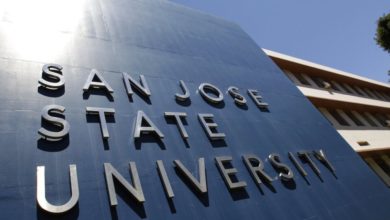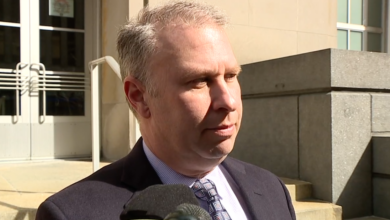MEXICO CITY – Vice President Kamala Harris caps her first foreign trip Tuesday in a high stakes visit to the United States' crucial partner in stemming the flow of migrants at the U.S. southern border: Mexico and its populist president, Andrés Manuel López Obrador, an important ally who's also been a critical voice of the Biden administration's immigration policies.
Harris will meet with López Obrador — known by his initials as AMLO — and later with local female entrepreneurs and labor leaders as she looks to deepen diplomatic ties with Mexico as part of the administration's broader strategy to address underlying causes of migration from the Northern Triangle countries of El Salvador, Honduras and Guatemala.
On her discussions with López Obrador, Harris told reporters Monday night the U.S. had "a longstanding partnership" with the neighboring country, a dynamic she would emphasize in addressing "Mexico's role as it relates to the region."

In recent weeks, Harris has spoken with López Obrador several times and held a virtual meeting with him in early May as she sought early commitments on stemming the flow of migrants at the U.S.-Mexico border. Symone Sanders, Harris' chief spokesperson, said the vice president would use the bilateral meeting to "build on that progress" from the first meeting and discuss the shared priorities of economic development, security cooperation and curbing irregular migration from Central America.
Greater cooperation in Central America
The vice president and AMLO will also witness the signing of a memorandum of understanding between the two countries that will focus on greater cooperation between the two nations' development agencies in Guatemala, Honduras and El Salvador.
Special Envoy Ricardo Zuniga said the memorandum was an important step as the U.S. and Mexico are "both destination countries" and share some of the same issues around migration.
"It’s very important to show that the United States and Mexico are collaborating and trying to improve conditions on the ground among our neighbors, because of the importance that other countries in Central America have for both of us," he said.
Harris also travels to Mexico Cityafter the country held midterm elections Sunday, in which López Obrador's Morena party, along with two smaller allied parties, appeared to win the majority in Mexico's lower chamber of Congress. The party, however, fell short of the two-thirds majority needed to push through controversial aspects of the president's nationalist agenda, according to initial election results.
‘High-level chess’:How Biden is navigating his relationship with Mexico’s President ‘AMLO’
López Obrador embraced President Joe Biden's administration,although the two got off to a rocky start. The Mexican president developed a friendship with former President Donald Trump, was one of the last foreign leaders to congratulate Biden for winning the 2020 election and, more important to Harris' visit, has blamed the U.S. president for the increase in migrants coming to the border. More recently, AMLO accused the U.S. of interventionism for giving money to an anti-corruption group critical of his government — just before a call with Harris.
The meetings follow Harris' visit Monday to Guatemala, where she met with President Alejandro Giammattei to discuss ways to improve living conditions to "give people a sense of hope" for a better future. But Harris also issued a stark warning to those looking to migrate to the U.S.: "Do not come. Do not come," she said. "I believe If you come to our border, you will be turned back."
Underscoring one of the key themes of the trip, the Biden administration announced a series of initiatives to tackle corruption, drug-smuggling and human-trafficking. The vice president also announced a new initiative to promote economic opportunities for Guatemalan women and girls.
Harris brings anti-corruption message
Harris emphasized the administration's commitment to anti-corruption during a press conference with Giammattei, who bristled when asked about allegations that he's cracked down on critics and meddled in the selection of judges on the country's Constitutional Court. He denied the allegations.
The vice president later told reporters that corruption was "the number one issue aside from vaccines and the pandemic" in her discussions in Guatemala.
Tensions over anti-corruption efforts are likely to follow Harris to Mexico, where at least 91 politicians — including 36 candidates and aspiring candidates — were killed ahead of the June 6 elections, underscoring violent conditions that drive migrants from their homes.
Sen. Clemente Castañeda, national coordinator for Mexico's Movimiento Ciudadano political party, told USA TODAY he thinks Harris faces a "big challenge" in trying to persuade AMLO to commit to U.S. priorities like anti-corruption, human rights protections and empowering women.
"These are not priorities of the current government," said Castañeda, who spoke to USA TODAY from Guanajuato a day after his party's candidate for mayor of Moroleón was killed on May 25.
Castañeda said he also hopes Harris raises the militarization of Mexico's northern and southern borders, which he said has led to poor treatment of Central American migrants.
As part of a regional strategy to curb the flow migration, Mexico agreed to deploy 10,000 troops to its southern border in April. Harris aides said the vice president and AMLO will discuss stepping up enforcement at Mexico's northern and southern borders.
"We believe that migration is a human right, particularly when people are facing violence and economic stagnation," Castañeda said. "What we would like is to support a regional approach and alliance to design economic and development policies that will encourage vulnerable people to stay in their homelands."
The U.S. southern border will be a focal point of Harris' discussions as she seeks cooperation on a politically fraught issue that's dogged the Biden administration in its first months. Republicans have criticized Biden and Harris for declining to visit the border. The vice president told reporters Monday she made her first foreign trip to Guatemala to address the key reasons migrants are fleeing their country, a strategy she said "is tangible and has real results.
"I will continue to be focused on that kind of work as opposed to grand gestures," she said.
The U.S. has faced a historic increase of migrants, many from Central America and Mexico, showing up at the southern border. In April, border patrol officials encountered 178,622 migrants, a slight increase from March that notched the highest level of apprehensions since April 2000.

Duncan Wood, senior adviser to the Wilson Center’s Mexico Institute, said one of the main goals of Harris’ trip to Mexico is to “build a positive, constructive relationship” with López Obrador and his government.
Wood noted that the U.S. and Mexico will eventually need to address an array of issues affecting the country, including trade conflicts, Mexico's energy sector, corruption, organized crime and drugs. Earlier this year, the State Department released its annual human rights report, which warned of Mexico's gang violence and limits on press freedom. It also criticized the country's prison and detention center conditions.
“They’re very much right now in that phase of a relationship of getting to know each other and building trust,” Wood said. “Further down the road, we'll get to the point where Harris and other folks from the US government can apply more pressure on Mexico on different themes.”
Ahead of the high-profile meeting, AMLO said Mexico would receive 1 million excess COVID-19 vaccine doses following the Biden administration's announcement Monday that it would release 25 million surplus doses to countries in need. Harris said she expects vaccine sharing to be on the agenda.
Activists are calling for Harris to use the meeting to reverse a controversial policy that allows Customs and Border Protection to expel undocumented migrants to prevent the spread of COVID-19 in holding facilities. The Trump-era policy, known as Title 42, remains in place as the Biden administration continues to grapple with an uptick in migrants at the border, but immigration advocates contend it's no longer necessary as COVID-19 restrictions are eased across the country.
White House press secretary Jen Psaki said Monday she "doesn't have any sense of the timeline" on when the Biden administration will lift the policy.
Reach Rebecca Morin at Twitter @RebeccaMorin_ and Courtney Subramanian on Twitter at @cmsub
Contributing: Associated Press
Source link










